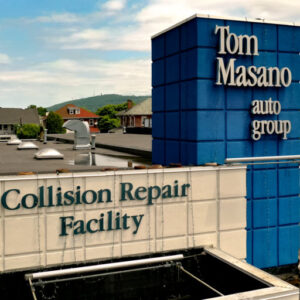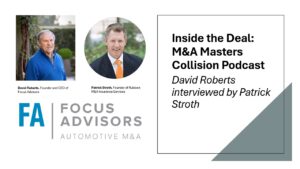The first six months of 2018 are now in the rearview mirror, NACE is rapidly approaching, so we at FOCUS are taking a few moments to look back and ahead.
Consolidator Growth Continues
Both Caliber and Gerber have continued their steady growth with both shop acquisitions and new brownfield and greenfield openings. Gerber’s most notable acquisition was Earth Collision’s three centers in the northwest Dallas area. Total acquisitions YTD for Gerber was 21 shops.
The most notable consolidator transaction thus far in 2018 was Caliber’s acquisition of Albany NY based H&V Collision, the first large MSO acquisition in the northeastern US. H&V was a family owned operation headed by Vartan Jerian, Jr. who led the company to seven shops in the Hudson Valley north of New York City.
Service King has slowed its acquisitions in 2018 but ABRA has more recently picked up the pace and expects to acquire or open as many as 40 shops in 2018.
By the Numbers
| Year End 2017 | As of July 11 2018 | |
| ABRA | 337 | 371 |
| Caliber | 527 | 590 |
| Gerber | 500 | 521 |
| Service King | 335 | 354 |
Super-regionals are surging – thanks to private equity investors.
Joe Hudson Collision Centers has been on a tear. Their acquisition of 13 Car Guys shops in central Florida is one of the largest transactions of 2018. JHCC now operates 77 locations in 6 states and is approaching $200 million in revenues. Carousel Capital out of Charlotte, having successfully sold franchisor Driven Brands (MAACO and Meineke) to Roark Capital several years ago, is aggressively funding their expansion.
Pro-Care acquired Austin Motor Mile and now operates 31 shops in Texas with nearly $100M in revenues, making it the third largest player in the Texas market. ProCare is supported by Kinderhook, a NY based private equity firm.
Franchisors and affiliations
Single shops and smaller MSOs are finding community in franchisors Carstar and Fix-Auto or in affiliations with Certified Collision Group or 1st Collision. Carstar has added over 30 locations through April this year with a total of 295 in US (over 500 in North America) while Fix now franchises 127 US locations with estimated combined revenues north of $350 million.
Top Concerns
Techs and technology remain the most critical issues facing operators. Techs are getting older, poaching is more and more common and the variety and complexity of new technology is outpacing the ability of many shops to stay abreast.
Uncertainty Abounds – as always.
The collision repair industry has been dealing with increasing uncertainty for more than 25 years. Since the consolidation phase gained traction in the late 90’s, the continuous challenge for most operators has been balancing a constantly changing – and conflicting – set of demands. Whether responding to insurers’ requirements or finding new capital or competing with the big guys, today’s operators know the decisions they need to make are often binary – get big or get out.
Getting out is accelerating – and so is growth of smaller MSOs.
Single shops are exiting more frequently in 2018 than in any year we have previously tracked. The exit of single shops creates growth opportunities not just for the consolidators and superregionals but increasingly for other MSOs. Many of the next 150 largest MSOs in have been rapidly growing on their own, most often by picking up the single shops in their respective markets.
On the horizon – pay attention to tariffs!
Proposed auto tariffs are estimated to increase imported (44% of all US Sales) car costs by $5,800 per vehicle (https://www.wsj.com/articles/u-s-dealers-expect-foreign-cars-to-cost-more-if-auto-tariffs-enacted-1531842271). The CEO of AutoNation predicts the industry will sell 2 million fewer vehicles and wipe out the profits of imported car dealers. (http://www.autonews.com/article/20180702/RETAIL07/180709967/)
Looking Further Ahead
A slowdown in new vehicle sales will also slow the integration of self-driving and ADAS vehicles into the fleet. That’s good news in the shorter term for collision repairers because owners will hang on to vehicles that are more repairable for longer.
Electric vehicles continue to increase their penetration of urban markets worldwide. Diesels are now banned in central cities across Europe and some cities in Asia. We expect similar bans on gasoline powered vehicles to follow. As US cities begin to adopt similar strategies, dense urban core transportation will increasingly EV based.
Visit Us at NACE
Just a quick reminder that there are some terrific panels at the MSO Symposium at NACE including one that David Roberts is chairing on Thursday August 9th “What Do I Do Now?” – an exploration of alternatives for smaller MSOs and single shops. We hope to see you there. If you plan to attend NACE we would welcome a conversation about your market, your business, or the outlook for the industry in general. Please email or call directly and we’ll arrange a time to meet.
July 2018: View Full PDF






